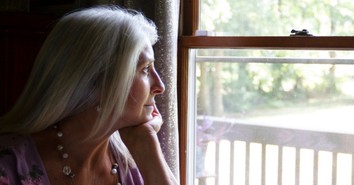Depression and Christmas

The "Holiday Blues," anxiety and even depression affect many people about this time of year. To some, remembrance of pleasant childhood memories now gone forever contrast with today's unpleasant realities. Issues such as family strife, unemployment with financial constraints, loneliness from prior losses of loved ones, isolation, unrealized expectations and even family gatherings with tension from estranged relatives may contribute to sadness and despair. The time of joy, cheer, wonderful family reunions and the enjoyment of deep, meaningful relationships just doesn't exist for many. Personal circumstances mock "It's a Wonderful Life."
But unfortunately, feelings of hopelessness and despair occur at any time of year for others. Unrelenting depression haunts the souls of many Christians day after day after day with nothing to blame, no clear cause and no sudden discovery of the underlying problem.
As a Christian medical doctor, I care for many committed Christians and have heard what follows.
She described her symptoms to me. She felt down, had no joy in formerly joyful activities, wanted to hide in her bedroom and pull the covers over her head, cried at anything and nothing, constantly barked at her husband and children and had considered suicide. She found simple chores impossible. Fellowship became painful to endure. Prayer became a hollow exercise. She searched her life for unconfessed sin and confessed it all. Worship meant talking with congregants after the service which took all her effort. She cried as she spoke. She tried everything her friends recommended; get out more, pray more, study the Bible more, exercise, take the latest nutriceutical, eat organic and even, "snap out of it." Nothing helped. I prescribed an anti-depressant for her.
Depression is the word in the church that must not be spoken. Those taking anti-depressants may find themselves stigmatized by pastors, elders or church members. I've had patients forbidden by husbands and elders from taking medicine for serious depression. I've had many Christian women take anti-depressants secretly, fearing the backlash waiting them should the church or their family find out.
I've heard some pastors rage from the pulpit, "We've given up God for a happy pill! Instead of depending on the power of God and the truth of his word, we've become the Prozac generation! Doctor's pass out depression pills like candy!" Perhaps you've heard sermons like that as well. Few conditions generate more controversy in the evangelical church than depression.
The word "depression" does not appear in the ESV translation of the Bible, but the Bible certainly addresses sorrow and despair often with vivid descriptions.
Even in David, the man after God's own heart, speaks of his despair. In Psalm 88:3-9, David writes,
For my soul is full of troubles,
and my life draws near to Sheol.
I am counted among those who go down to the pit;
I am a man who has no strength,
like one set loose among the dead,
like the slain that lie in the grave,
like those whom you remember no more,
for they are cut off from your hand.
You have put me in the depths of the pit,
in the regions dark and deep.(ESV)
David also wrote,
"Save me, O God! For the waters have come up to my neck. I sink in deep mire, where there is no foothold; I have come into deep waters, and the flood sweeps over me. Psalms 69: 1,2. (ESV)
The Bible generally attributes sorrow and despair to enemies or unconfessed sin, both of which can decidedly cause depression. Secret sins hurt the most. Failure to repent, turn from the sin and receive forgiveness and failure to appreciate the glory of God, the magnitude of His sacrifice, the joy of His service and the wonder of His love and His holy word can cause the Christian enter the darkness of despair.
The seriousness of spiritual depression and the need of repentance, forgiveness, turning from sin, restoration of relationships, seeking the face of God and recognition of the sovereignty of God cannot be overemphasized. Spiritual depression robs us of the certainty of God's care and providence. Pastor and elders must boldly proclaim the gospel seeking restoration of the straying or troubled saint. The family of God needs to be involved; encouraging, coming along side, supporting and helping the downcast. God can heal if He chooses—and He does.
The puritans recognized depression and called it melancholy of the soul. They admonished confession, repentance, forgiveness and pleading at the throne of God for mercy. But the Puritans also recognized an endogenous depression which happened to the spiritually upright, to those with no cause for the turmoil and despair within. Richard Baxter, a Puritan pastor wrote, "If other means will not do, neglect not medicine; and though they will be averse to it, as believing that the disease is only in the mind, they must be persuaded or forced to it."
My story continues,
When she return four weeks later, she said, "Doctor Anderson, I feel normal for the first time in eight years. I can pray and worship and fellowship again. Christ has become more real than ever. My husband and family cannot believe the change."
Pastors, elders and the church family need to acknowledge the medical side of depression and not just the spiritual side of depression. Medical depression exists and affects the saved and unsaved alike. The seriously depressed who find healing and relief in medical treatment benefit from the common grace of God which is showered on all humanity (it rains of the just and unjust alike). Those saints should not be castigated, belittled or shunned.
True medical depression is hard to understand for those who have never experienced it. But the depressed who find themselves in the pit with no way out, those who view suicide as a relief from this despair and those who wish for death every night as they crawl into bed understand. They need kindness, understanding, and help from the church without the side looks and whispers. They need the body of Christ to come along side, provide Christian love, care and help, just like one would with a grieving widow. The depressed need understanding and prayer, not a scold.
Matt Anderson, MD is an obstetrician/gynecologist who has practiced for 28 years. He and his wife have four married children and 14 grandchildren. He is a member of the American Association of Prolife Obstetricians and Gynecologists (aaplog.org). He and his wife attend the Mounds View campus of Bethlehem Baptist Church in Minneapolis, MN. Dr. Anderson has written for WORLD Magazine (worldmag.com) and occasionally blogs at mdviews.wordpress.com.
Publication date: December 15, 2010
Visit Crosswalk's Christmas Facebook page at www.facebook.com/LuvChristmas.
Originally published November 20, 2012.





